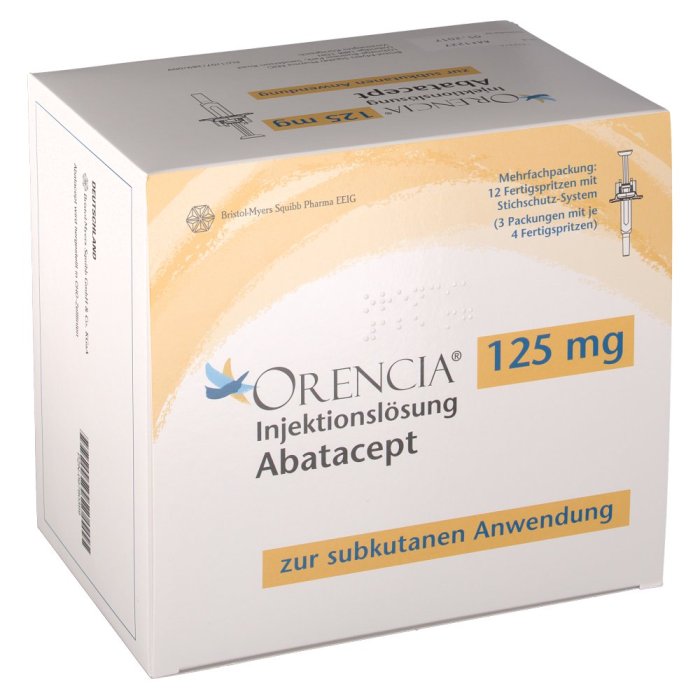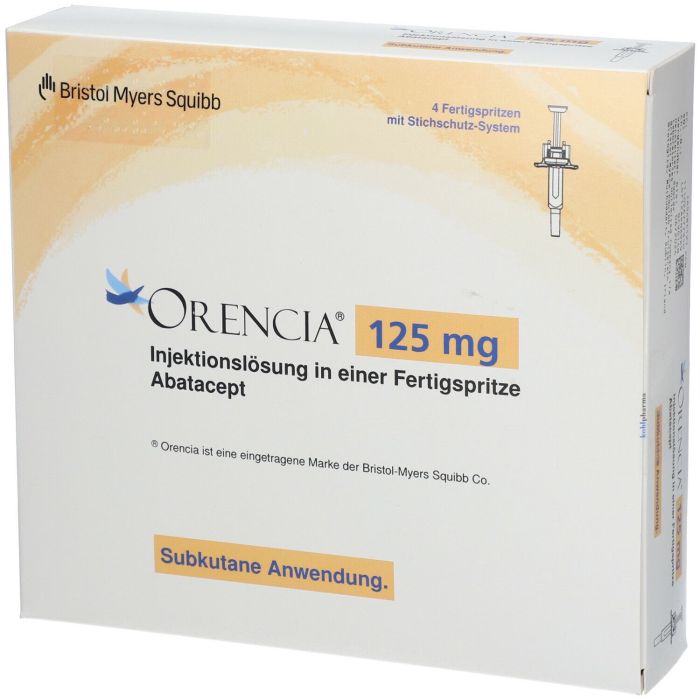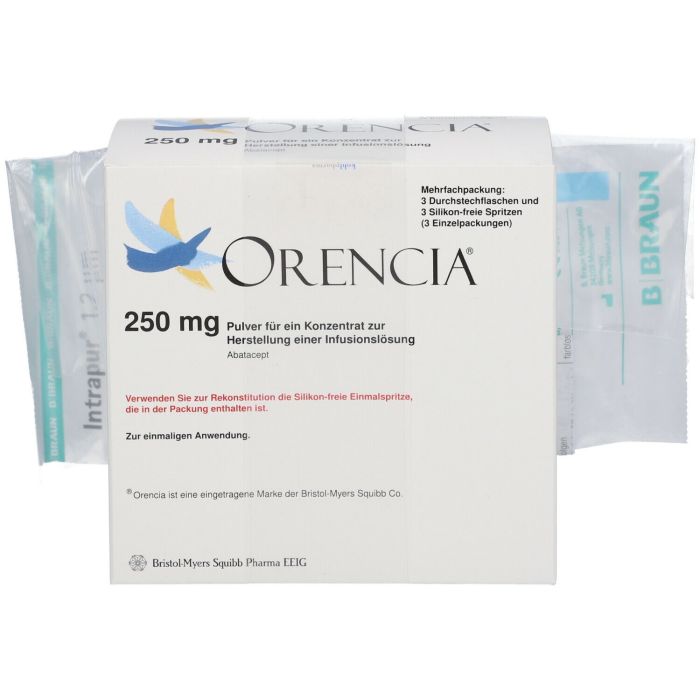Orencia, also known by its generic name abatacept, is a powerful immunosuppressant medication that plays a crucial role in managing a range of autoimmune diseases. Manufactured by Bristol Myers Squibb, Orencia works by targeting specific immune cells and modulating their activity, effectively dampening the body’s inflammatory response.
This comprehensive guide delves into the intricacies of Orencia, exploring its mechanism of action, approved indications, dosage, potential side effects, and drug interactions. We’ll also examine patient perspectives, ongoing research, and the promising future directions of this vital medication.
Orencia
Orencia is a medication used to treat various autoimmune diseases. It is a powerful tool for managing symptoms and improving the quality of life for many patients. This article provides a comprehensive overview of Orencia, covering its full name, manufacturer, and intended uses.
Orencia’s Full Name and Generic Name
Orencia’s full name is abatacept. It is a biologic medication, meaning it is derived from living organisms. It is available as a solution for intravenous (IV) infusion and as a subcutaneous injection.
Orencia’s Manufacturer
Orencia is manufactured by Bristol Myers Squibb, a global pharmaceutical company known for its research and development in various therapeutic areas, including immunology.
Orencia’s Intended Use
Orencia is primarily used to treat rheumatoid arthritis (RA), a chronic autoimmune disease that causes inflammation of the joints. It is also approved for treating psoriatic arthritis, an inflammatory condition that affects the joints and skin, and ankylosing spondylitis, a disease that causes inflammation of the spine. Orencia works by blocking the activation of T cells, a type of white blood cell that plays a key role in the immune response. By inhibiting T cell activation, Orencia helps to reduce inflammation and slow the progression of these diseases.
Orencia
Orencia (abatacept) is a medication used to treat a variety of autoimmune diseases, including rheumatoid arthritis (RA), psoriatic arthritis, and ankylosing spondylitis. It works by targeting a specific molecule involved in the immune system’s response to inflammation.
Mechanism of Action
Orencia is a selective costimulation modulator that works by blocking the interaction between two important molecules involved in immune cell activation: CD80 and CD86 (expressed on antigen-presenting cells) and CTLA-4 (expressed on T cells). This interaction is crucial for the activation and proliferation of T cells, which are key players in the immune response.
Orencia binds to CTLA-4 with higher affinity than CD80/CD86, effectively blocking the interaction between these molecules. This blockage prevents the activation of T cells, leading to a reduction in inflammation.
Orencia’s mechanism of action can be summarized as follows:
* Orencia binds to CTLA-4 on T cells.
* This binding prevents CD80/CD86 on antigen-presenting cells from interacting with CTLA-4.
* This interaction is essential for T cell activation and proliferation.
* By blocking this interaction, Orencia inhibits T cell activation and reduces inflammation.
Orencia
Orencia (abatacept) is a prescription medicine used to treat various autoimmune diseases. It works by blocking the interaction between certain immune cells, reducing inflammation and the damage it causes.
Indications for Use
Orencia is approved by the Food and Drug Administration (FDA) for the treatment of several autoimmune diseases. These indications, along with a brief description of how Orencia helps manage each condition, are summarized in the table below.
| Indication | Disease Description | Orencia’s Role |
|---|---|---|
| Rheumatoid arthritis (RA) | A chronic inflammatory disease that affects the joints, causing pain, stiffness, and swelling. | Orencia helps to reduce inflammation and slow the progression of joint damage in RA. |
| Psoriatic arthritis (PsA) | A form of arthritis that affects people with psoriasis, causing joint pain, stiffness, and swelling. | Orencia helps to reduce inflammation and improve joint function in PsA. |
| Ankylosing spondylitis (AS) | A chronic inflammatory disease that affects the spine, causing pain, stiffness, and inflammation. | Orencia helps to reduce inflammation and improve spinal mobility in AS. |
| Juvenile idiopathic arthritis (JIA) | A group of autoimmune diseases that affect children, causing joint pain, stiffness, and swelling. | Orencia is used to treat children with JIA who have not responded adequately to other treatments. |
| Crohn’s disease | A chronic inflammatory bowel disease that affects the digestive tract, causing abdominal pain, diarrhea, and weight loss. | Orencia helps to reduce inflammation and improve symptoms in Crohn’s disease. |
| Ulcerative colitis | A chronic inflammatory bowel disease that affects the colon, causing diarrhea, rectal bleeding, and abdominal pain. | Orencia helps to reduce inflammation and improve symptoms in ulcerative colitis. |
Orencia

Orencia (abatacept) is a medication used to treat rheumatoid arthritis (RA), psoriatic arthritis (PsA), and ankylosing spondylitis (AS). It is a biologic drug that works by blocking the activation of T cells, which are a type of white blood cell that plays a role in inflammation.
Dosage and Administration
Orencia is available as a concentrate for intravenous (IV) infusion and a solution for subcutaneous (SC) injection. The dosage of Orencia varies depending on the indication and the patient’s weight.
The recommended dosage of Orencia for RA, PsA, and AS is:
- Intravenous Infusion: 10 mg/kg every 4 weeks.
- Subcutaneous Injection: 125 mg every 2 weeks.
The dosage of Orencia may be adjusted based on the patient’s response to treatment.
Orencia is typically administered by a healthcare professional. For intravenous infusion, the medication is given over 30 minutes. For subcutaneous injection, the medication is given into the abdomen, thigh, or upper arm.
It is important to note that the frequency of administration of Orencia may vary depending on the patient’s individual needs and response to treatment.
Orencia
Orencia (abatacept) is a medication used to treat rheumatoid arthritis (RA), psoriatic arthritis, and ankylosing spondylitis. It works by blocking the activity of certain immune cells that cause inflammation in the joints. Like all medications, Orencia can cause side effects, some of which may be serious.
Potential Side Effects, Orencia
It is important to be aware of the potential side effects of Orencia and to discuss any concerns you may have with your doctor.
| Side Effect | Frequency | Severity |
|---|---|---|
| Common side effects (affecting 1 in 10 people or more) | ||
| Upper respiratory tract infection | Common | Mild |
| Nasopharyngitis (inflammation of the nose and throat) | Common | Mild |
| Headache | Common | Mild |
| Diarrhea | Common | Mild |
| Nausea | Common | Mild |
| Serious side effects (affecting 1 in 100 people or more) | ||
| Infections | Uncommon | Moderate to Severe |
| Hepatitis (inflammation of the liver) | Uncommon | Moderate to Severe |
| Pneumonia (infection of the lungs) | Uncommon | Moderate to Severe |
| Tuberculosis (infection of the lungs) | Rare | Severe |
| Heart failure | Rare | Severe |
| Stroke | Rare | Severe |
| Cancer | Rare | Severe |
Orencia

Orencia (abatacept) is a medication used to treat certain autoimmune diseases. It works by blocking the activation of T cells, which are a type of immune cell that plays a role in inflammation. Orencia is available as an intravenous (IV) infusion and as a subcutaneous injection.
Contraindications
Orencia is not suitable for everyone. There are certain conditions or situations in which Orencia should not be used. These contraindications are in place to minimize the risk of serious side effects and ensure patient safety.
- Active, severe infections: Orencia suppresses the immune system, making the body more susceptible to infections. Using Orencia during an active, severe infection can worsen the infection and lead to complications. It is crucial to treat any active infection before starting Orencia.
- Known hypersensitivity to abatacept or any of its components: Individuals with a history of allergic reactions to abatacept or any of its components should not use Orencia. This is to prevent severe allergic reactions, such as anaphylaxis, which can be life-threatening.
Orencia

Orencia (abatacept) is a medication used to treat rheumatoid arthritis (RA), psoriatic arthritis (PsA), and ankylosing spondylitis (AS). It is a type of medication called a biologic, which is a protein that helps to block the immune system from attacking the body’s own tissues.
Monitoring and Management
Regular monitoring is essential to ensure the effectiveness and safety of Orencia therapy.
- Laboratory Tests: Blood tests are crucial to monitor complete blood count (CBC), liver function tests (LFTs), and renal function tests. These tests help to identify any potential side effects or complications related to Orencia therapy.
- Infusion Reactions: Patients should be closely monitored for infusion reactions, which can occur during or shortly after Orencia administration. These reactions can range from mild to severe, and may include fever, chills, rash, itching, or difficulty breathing.
- Infections: Orencia can suppress the immune system, increasing the risk of infections. Patients should be advised to report any signs of infection, such as fever, cough, sore throat, or unusual fatigue.
- Immunizations: Live vaccines are generally not recommended during Orencia therapy due to the risk of infection. Patients should consult with their healthcare provider regarding vaccination recommendations.
- Disease Activity: Regular monitoring of disease activity is essential to assess the effectiveness of Orencia therapy and adjust treatment as needed. This may involve monitoring joint swelling, pain, and stiffness, as well as other disease-specific measures.
Managing Potential Side Effects
Orencia, like all medications, can cause side effects. While most side effects are mild, some can be serious.
- Infusion Reactions: Pre-medication with antihistamines and corticosteroids can help to prevent or minimize infusion reactions.
- Infections: Patients should be advised to practice good hygiene and avoid contact with people who are sick.
- Hepatitis B Reactivation: Orencia can reactivate latent hepatitis B virus infection. Patients with a history of hepatitis B infection should be monitored closely for signs of reactivation.
- Other Side Effects: Other potential side effects of Orencia include headache, nausea, diarrhea, and abdominal pain. These side effects are usually mild and tend to improve over time.
Patient Education and Self-Management
Patient education is crucial for successful Orencia therapy.
- Understanding the Medication: Patients should be informed about the purpose of Orencia, how it works, and its potential side effects.
- Monitoring for Side Effects: Patients should be educated about the signs and symptoms of potential side effects and encouraged to report any concerns to their healthcare provider.
- Self-Management Strategies: Patients can help manage their condition by following a healthy lifestyle, including a balanced diet, regular exercise, and stress management techniques.
- Adherence to Treatment: Patients should be encouraged to adhere to their prescribed treatment regimen, including taking their medication as directed and attending scheduled appointments.
Orencia
Orencia, also known as abatacept, is a medication used to treat autoimmune diseases like rheumatoid arthritis (RA), psoriatic arthritis, and ankylosing spondylitis. It works by suppressing the immune system’s response to inflammation.
Patient Perspectives and Experiences
Orencia’s effectiveness and safety vary from patient to patient. Here are some real-life stories and testimonials from individuals who have used Orencia to manage their autoimmune conditions:
| Patient Name | Condition | Experience with Orencia | Insights |
|---|---|---|---|
| Sarah | Rheumatoid Arthritis | Orencia has significantly reduced my joint pain and inflammation, allowing me to be more active. | I experienced some initial side effects, but they subsided after a few weeks. Orencia has given me back my quality of life. |
| David | Psoriatic Arthritis | Orencia has helped control my joint pain and reduce the severity of my psoriasis. | Orencia has been a game-changer for me. I can now participate in activities I couldn’t before. |
| Emily | Ankylosing Spondylitis | Orencia has helped manage my back pain and stiffness, allowing me to sleep better and move more easily. | Orencia has allowed me to maintain a more active lifestyle. |
Orencia
Orencia (abatacept) has revolutionized the treatment of autoimmune diseases, demonstrating efficacy in managing rheumatoid arthritis, psoriatic arthritis, and ankylosing spondylitis. However, the potential applications of Orencia extend beyond these conditions, with ongoing research exploring its therapeutic potential in other inflammatory and autoimmune disorders.
Future Applications of Orencia
Orencia’s mechanism of action, targeting the immune system’s T-cell activation, suggests its potential in treating a wider range of inflammatory and autoimmune conditions. Researchers are investigating its efficacy in:
- Systemic lupus erythematosus (SLE): A clinical trial (NCT01671449) is evaluating the safety and efficacy of Orencia in patients with SLE. Early results suggest potential benefits in reducing disease activity and improving quality of life.
- Crohn’s disease and ulcerative colitis: Orencia’s ability to modulate the immune response makes it a promising candidate for treating inflammatory bowel diseases. Studies are underway to assess its effectiveness in these conditions.
- Multiple sclerosis (MS): Orencia’s potential to dampen inflammation in the central nervous system is being explored in clinical trials for MS. Early findings suggest a potential role in managing disease progression.
- Vasculitis: Orencia’s ability to inhibit T-cell activation may be beneficial in treating vasculitis, a group of diseases characterized by inflammation of blood vessels. Clinical trials are investigating its efficacy in various types of vasculitis.
- Scleroderma: Orencia’s anti-inflammatory properties are being investigated in clinical trials for scleroderma, a rare autoimmune disease that affects the skin and internal organs.
Optimizing Orencia Therapy
Research and development efforts are focused on optimizing Orencia therapy to enhance its effectiveness and minimize potential side effects.
- Personalized medicine: Identifying biomarkers that predict patient response to Orencia could enable personalized treatment strategies, ensuring optimal efficacy for individual patients.
- Combination therapies: Combining Orencia with other therapies, such as biologics or conventional disease-modifying antirheumatic drugs (DMARDs), may enhance treatment outcomes for certain patients.
- Biosimilar development: Developing biosimilars of Orencia could provide more affordable treatment options for patients.
- Targeted drug delivery: Developing targeted drug delivery systems could improve the efficacy of Orencia while reducing potential side effects by delivering the drug directly to the affected tissues.
Emerging Technologies and Approaches
Emerging technologies and approaches could enhance the use of Orencia in the future.
- Nanotechnology: Nanotechnology-based drug delivery systems could enhance Orencia’s bioavailability, target specific tissues, and improve its therapeutic efficacy.
- Immunotherapy: Combining Orencia with other immunotherapies, such as checkpoint inhibitors, could potentially enhance treatment outcomes for specific diseases.
- Artificial intelligence (AI): AI algorithms could be used to predict patient response to Orencia, optimize treatment strategies, and monitor disease activity.
Orencia has emerged as a valuable therapeutic option for individuals battling autoimmune diseases, offering a potential path towards improved quality of life and disease management. Understanding its complexities, including its mechanism of action, potential side effects, and interactions, is crucial for both patients and healthcare professionals. As research continues to unravel the intricacies of Orencia, we can expect further advancements in its application and optimization, paving the way for even more effective treatments in the future.
Orencia is a medication used to treat certain autoimmune diseases, such as rheumatoid arthritis and Crohn’s disease. While Orencia works by suppressing the immune system, other medications like lanreotide , a somatostatin analog, are used to manage conditions like acromegaly and neuroendocrine tumors. Both medications play distinct roles in managing specific medical conditions, demonstrating the diverse approaches available in modern medicine.